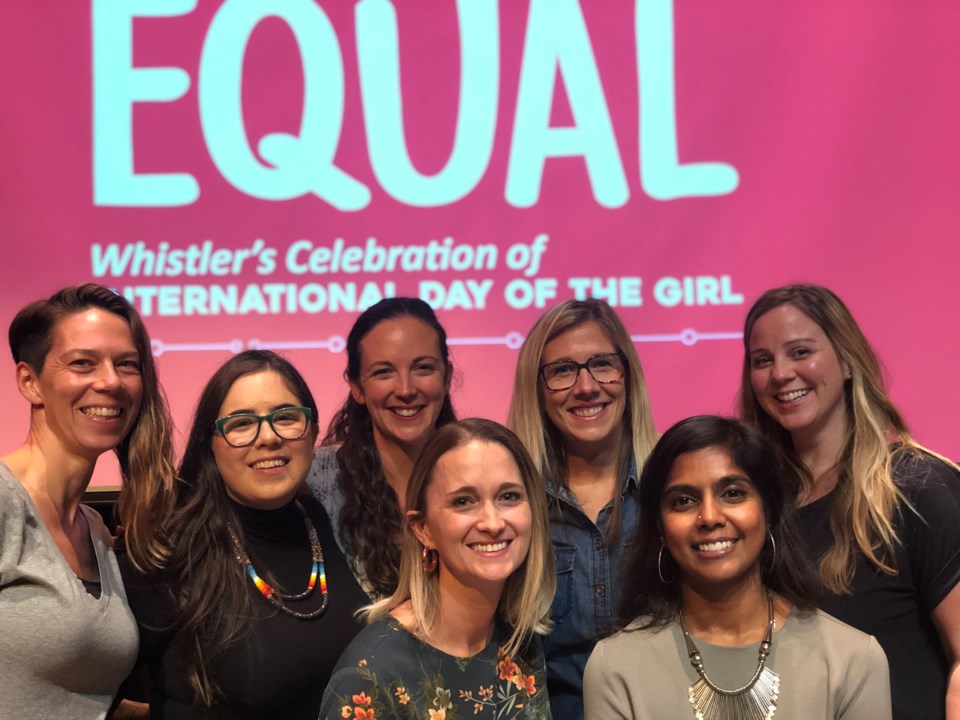At Whistler’s last International Day of the Girl event in 2019, an 11-year-old stepped up to the mic to ask a simple question that seemed to stump the panellists.
“’When I turn on the TV, I always can find boys playing soccer, but where can I see the girls?’” recalled event founder Dee Raffo. “It’s a huge issue, and we know it, but we don’t really know how to fix it, so when we were thinking of topics for this year, we thought we’d try to dive in and answer this girl’s question because it’s an important one that I think has repercussions throughout [the push] for gender equality—and not just in sports.”
Hosted and organized with the help of Whistler Secondary School’s (WSS) student-led Leadership Team, the Oct. 13 event will feature four panellists from across the Canadian sporting world: Jacie deHoop, co-founder of The GIST, a sports media start-up made by women that looks to make athletics more accessible and inclusive to all sports fans; Natasha Cyrille, marketing and communications coordinator for Canadian Women & Sport, an organization founded in 1981 to advocate for progressive change within Canada’s sport system; Dr. Katie Lebel, assistant professor at Ryerson University, whose research focuses on gender equity in sport, with a particular emphasis on branding and consumer behaviour; and Laura Stacey, former hockey player who won gold at the 2012 IIHF U18 Women’s World Championships, before suiting up for the silver medal-winning team at the 2017 IIHF Women’s World Championships.
The event comes on the heels of the Tokyo Olympics, which, despite being touted as the most gender-equal Games of all time, were marked by controversy after women athletes in gymnastics drew attention to the double standard that exists in some sports, in which women are required to wear skimpy outfits the men aren’t.
In a year when women’s basketball players at the March Madness tournament called out the NCAA for its woefully inadequate training facilities compared to the men, when the U.S. women’s soccer team fought for—and won—equal pay to their male counterparts, when women’s gymnasts continue to speak out about years of systematic sexual abuse at the hands of the U.S. national team doctor, and, in just the last few days, the third National Women’s Soccer League coach since August was fired over allegations of sexual misconduct, it’s clear that, despite the progress that has been made, women athletes still have to face a culture of sexism—or worse—that is pervasive.
“I think that creating a safe, abuse-free space is hugely important in sports,” Raffo said. “You would be surprised what women are still battling. It seems crazy and almost ridiculous to me that they’re forced to wear bikini bottoms in beach volleyball. The mind boggles. Even when some of the sports federations make rules, I’m not aware of anybody that’s policing them very well.”
Even in Whistler, known for its progressive mindset, there remains a largely male-dominated sports scene that can create barriers to entry for girls and women, said Lauren Hamm, Grade 11 WSS student who helped in organizing and marketing the event.
“If you get invited to go on a bike ride and you’re with a bunch of these guys who have been biking a long time, you’re always insecure about your ability because it is so male-dominated. That is always on you all the time and you’re thinking, ‘How will they see me? I’m not as good as them,’” she said.
That strikes home the importance of having guys included in the conversation, said Grade 12 student and organizer Hugo Steiner.
“It can’t just be a women’s issue because it’s everyone’s issue,” he noted. “It should be predominantly women, but you need to have guys standing up for them as well and joining in.”
Grade 11 student and organizer Maya Ferdinands said the event is especially targeted at young girls, like the 11-year-old that wondered why she couldn’t find women’s soccer on the TV dial.
“For young girls, they may have seen the inequality in sport but they don’t know that they can make a change,” she said.
The event is scheduled from 5 to 7 p.m. at the Maury Young Arts Centre, and tickets are $10, available at myzonetickets.com/whistleridg2021. There’s also a livestream ticket option, by donation. Featuring a silent auction with a $500 prize pack, all proceeds go directly to the Howe Sound Women’s Centre and The Shoe Project.




